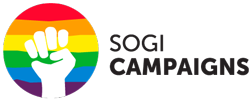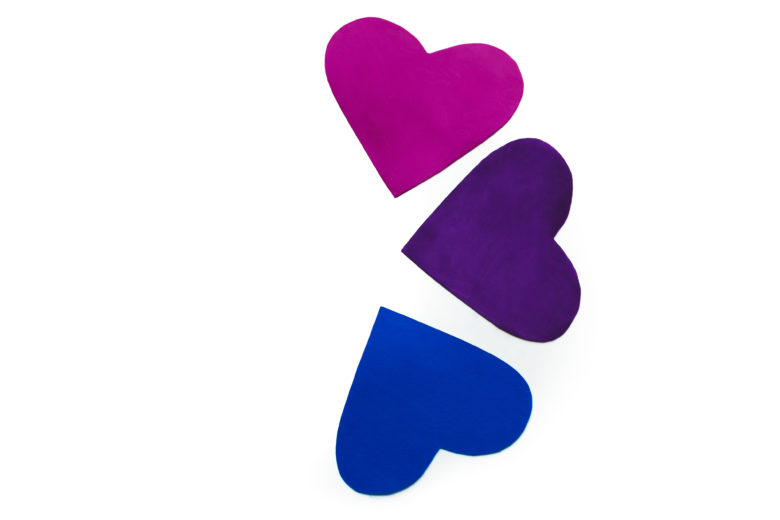11 People Explain What Bi+ Visibility Means to Them
Article appeared first at Teen Vogue
A lot of stereotypes exist about what it means or looks like to be bisexual or identify under the umbrella of bi+. Ultimately, to be bi+ means to have an attraction to more than one gender. Misconceptions about bi+ people stereotype us as greedy, confused, or going through a phase. That biphobia can also be internalized personally by people who do experience attraction to and relationships with people of different genders, and affect how bi+ people feel about their identities.
Whatever you think you know or understand about bisexuality from tropes in pop culture, TV, movies, or even conversations with people might not necessarily be correct. To set the record right, the best thing we can do is listen to bi+ folks themselves, because it’s clear there are many ways to own your identity and experience bisexuality, pansexuality, or queerness.
Here are 11 people on what being bi+ looks like and means to them.
Raksha, 23, bisexual Indian woman
“Love is something I give easily and often. It’s a privilege to experience any sort of relationship with another human being and, to me, being bi simply means having an open heart and mind to letting all relationships grow without imposing an artificial upper limit on their intimacy. I’m proud to be fearless in love, growing from the pain and joy it brings time and time again. In short, being bi feels like the radical act of loving love.”
Matthew, 28, non-binary bisexual person
“Being openly bisexual is only something I’ve come into in the last few years. After many years of knowing I was bi but only sharing that with close friends, I began to see more and more discussion about bisexual erasure and invisibility. I realized in 2017 that I could use my privilege as a white, assigned male at birth person with supportive family and friends and a stable career to make myself more visible as a bisexual person by coming out online.
Today, my visibility looks like a line in my Twitter location field that says I’m bi, showing up to LGBTQ+ events and spaces in the city and beyond, and sharing bisexuality news and memes on my social media.
[I want people to know that] bisexuality is trans-inclusive. This is incredibly important and widely misunderstood. Being bisexual means that I am attracted to people of all genders, but that gender can play a role in that attraction. Identifying as bisexual doesn’t mean you’re a slut, it doesn’t mean you can’t make up your mind, it doesn’t mean you’re in a ‘phase.’ Your sexual orientation is something to be celebrated, not denigrated. Also, if a bisexual person is dating or having sex with someone of a different gender, it doesn’t make them any less bisexual.”
Maria, 23, bisexual person
“I first had feelings for the same sex at 5 years old and questioned my sexuality well into adulthood. Even at 23, I’m still not 100% sure where I stand. You’re allowed to love who you want and express yourself however you want and are under no pressure to proudly wear the bi+ label. Some people are visibly bi activists, and some people prefer to keep it on the DL. Both are okay! Due to the prominence of bi erasure, people tend to pick gay or straight as it’s just easier to navigate the world that way. That’s why being visibly bi is an act of education and resistance. You’re showing people, ‘Yes, you can be bi. You don’t have to choose. Whatever you feel internally, you can express externally.’”
Lizet, 24, bisexual Black woman
“Being visibly bi means not looking visibly bi or queer for me, because I’m in a long term relationship with a cis man and people assume we’re straight. It’s frustrating, and has taken years for me to stop internalizing biphobic messaging that invalidates my identity because I’ve ‘picked a side.’ It’s a constant struggle between wanting people to understand my identity and picking my battles with ignorant people. Bisexuality doesn’t look a specific way. It doesn’t matter if someone is with someone of their same gender or another, it doesn’t change their identity. We’re also not more likely to cheat or more likely to have STDs/STIs because we’re bisexual.”
Rachael, 31, bisexual sex educator
“I spent my late teens and 20’s in a long-term relationship with a cis man, and I thought my attraction to other genders ‘didn’t count’ since I’d only dated men. A few years ago we decided to open up our relationship, and it’s been really wonderful to get to explore my attraction and the connections I have with people of all genders.
There’s some bi-erasure, too, since people still often assume I’m straight because I’m married to a man, but society slowly seems to be catching on that the relationships we’re in don’t dictate our orientation. I think there’s this cultural idea that while we’re all assumed straight as a default, we somehow have to ‘qualify’ to call ourselves bi/queer/etc. It took me a long time to realize that there are no qualifications—your feelings about yourself and your identity are valid. It’s also okay to explore those feelings even if you’re not sure, and if you feel comfortable identifying one way now and feel you want to identify differently in the future, that’s okay too. I think sexuality is, and can be, fluid.”
Maddie, 26, non-binary bisexual person
“I have been openly bisexual for many years with all of the struggles and joys that come along with it. Every year I grow to understand myself, my desires, my needs and my dreams in a relationship a little more. Being bisexual and non-binary means being able to shed all of the gendered preconceptions I grew up with about what relationships and sex are supposed to look and instead get to know each cutie I meet as a person who I can connect with in a new way.”
Sasha, 24, bisexual woman
“My journey to owning my bisexuality involved a lot of challenging self reflection, but has ultimately brought me a lot of inner peace! I went through a period in high school when I was incredibly confused about my sexuality. I was president of my high school’s Gay Trans Straight Alliance, while also hooking up with a girlfriend of mine, yet I was somehow still convinced that I was straight. It’s important for me to be loud and proud about my bisexual identity today, because I didn’t have any bisexual role models growing up.
The more I’ve immersed myself in the bi+ community, the more experiences I realize I have in common with other bi+ folks that I don’t have with people of other sexualities.
Some of my favorite experiences this year were weekly Friday nights with my bi+ girlfriends at San Francisco’s new and only queer/lesbian bar Jolene’s, watch parties of our favorite new bi reality TV show Are You The One, and checking out the growing meetups in San Francisco specifically for the bi+ community! Bi+ people are the biggest subset of the LGBTQ+ community, which means there’s a huge community here ready to welcome you.”
Ry, 18, genderqueer bi+ person
“To me, being openly and visibly bi+ is simply unashamedly talking about being bi+. That said, I don’t think there’s any one way to be, and you can be confident and settled in your bi+ identity without being open and without being a symbol of visibility. What I want the world to know about being bi+ is that, just as it is with all things, it happens on a spectrum. Not everyone’s bi+ identity is the same.”
Olivia, 22, bisexual woman
“For me, being openly and visibly bisexual is about actively dismantling our ideas of what love, romance, gender, and sexuality look like. It’s about disrupting our ideas of what relationships can and should look like. As a bisexual high femme woman, it’s also about disrupting what queerness looks like. Queerness looks like me in a floral dress and a full face of makeup, just as much as it looks like me in Doc Martens and black lipstick. Queerness looks different for everyone, and that doesn’t make any of us less queer.”
Eva, 23, bisexual woman
“I’m pretty online about my bisexuality. I came out on my YouTube channel about a week after I came out to a lot of important people in my life. While I don’t talk about my own sex life on my sex ed channel, I’ve been open about my bisexuality, talking about struggling with internalized biphobia, sexual fluidity, and my journey finding my own queer community. Besides that, I’ve had the opportunity to work in queer-positive spaces and live in pretty accepting cities, so flagging as queer in order to be visible for myself and others is important to me. For me, that’s wearing pride pins, combat boots, my nose ring, etc.
What I want people to understand about bisexuality is we aren’t ‘gay lite.’ Bi+ people have a unique experience and our own unique struggles. Don’t create gay events or supports and just assume they’ll work for bi+ folks in the same way, and please see bisexuality as a full identity.”
Helen, 26, queer woman
“Being bi+ is a beautiful thing. It means opening yourself up to a world of beautiful human beings and releasing expectations built around partnering. It means it is easier to see good qualities in people — even if you aren’t interested in dating them — because your natural state is to be open to everyone.”


Comments are closed.